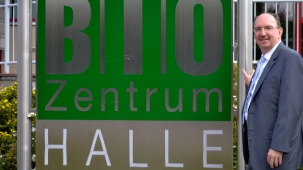The bio-based future as challenge for a generation
Saxony-Anhalt has already begun as a pioneer
All indicators point to success: The excellence cluster "BioEconomy" has steadily grown since it emerged victorious from the competition of the Federal Ministry of Education and Research (BMBF) in 2012. Approximately 80 partners from industry and research are now members of the network. By joining forces, they want to make central Germany a Europe-wide model region for bio-economic processes. This is a major effort which has excellent opportunities due to the favourable location conditions and financial support. The business economist Horst Mosler, manager of the excellence cluster, explains how it can succeed in anchoring the bio-economy in society.
The bio-economy is on the horizon. What exactly is behind it and what represents the location of Saxony-Anhalt?
This includes all areas that process or use renewable raw materials. A particular requirement of the bio-economy is to maximise the use of these materials. There is much to be said about the location of Saxony-Anhalt. There are many companies and research institutions here working on bio-economic concepts and products. Furthermore, the state has excellently developed chemistry parks, which form the basis for an integrated future bio-economy. The first signs of raw material change can already be seen there. In order to form a sustainable bio-economy from these individual approaches, we need coordinated action between politics, science and business. Saxony-Anhalt is also a pioneer in this. This is how the lead market "chemistry and bio-economy" was defined in the current phase of the regional innovation strategy. Thus, the bio-economy not only has opportunities in Saxony-Anhalt, it also provides opportunities for Saxony-Anhalt and the economy throughout Central Germany.
What opportunities do you see for the future development of the bio-economy?
Saxony-Anhalt has the conditions for the implementation of a competitive bio-economy like no other region in Europe at the moment. Reasons for this include the unused raw material potentials, such as extensive beech stands. Only a few know that 40 percent of the national stand of this tree species is situated in central German forests. Unfortunately, a large proportion of these are only used thermally, i.e. they are burned. Our incentive in the cluster is to find new and more sustainable uses of materials.
How will you achieve this?
We are not working on a single intended use. Our goal is a complete value-added chain. To stay with the example: we are looking for ways to fully make use of the tree. This also includes waste material which cannot be used for the production of wood products. For example, lignin can be extracted, which can be used as a bio-based raw material for plastics.
40 million euros of funding currently goes into the excellence cluster. How are these funds distributed?
The funding is distributed to all partners involved depending on the size of the projects. There are currently around 100 research projects in the cluster, all dealing with different topics. New partners that can introduce sustainable ideas are also welcome.
For which industries is the bio-economy particularly of interest?
A cross-sector approach results in links for numerous industrial sectors. The forestry and agriculture sector serves as suppliers of raw materials for the development of new markets. Waste materials and by-products of the timber industry as well as the pulp and paper industry find new applications as raw materials and aggregates. The construction industry can also benefit from resource-efficient new materials. The chemical and plastics industry can replace fossil fuels with renewables in the long term. Even the cosmetic and pharmaceutical industry has used increasingly more bio-based materials and methods. Composite materials and lightweight components made from renewable raw materials are of interest for the automotive industry and its suppliers.
Will there be enough specialist staff for this huge industry in the future?
As in all economic sectors, there will also be a short supply of skilled personnel for the bio-economy in the foreseeable future. To make matters worse, the new processes and new market-based approaches also create new job profiles. This means that the future demand for skilled labour cannot be covered by today's training programmes. Together with the state and federal policies as well as educational institutions, the participants in the BioEconomy cluster are working on new vocational training programmes and areas of specialisation in further education. A step in this direction is the establishment of a new degree course "Pharmaceutical Biotechnology" at the Martin Luther University of Halle-Wittenberg. The concept is currently being developed.
What needs to change with consumers to that the bio-economy has a chance in the long term? Consumer attitudes have already changed. Consumers have increasingly asked for sustainably produced products and are interested in the materials used. They are even willing to pay more for it. In the future, they must learn to look more closely since sustainably produced products often do not distinguish themselves from conventional products at first glance.
What are your visions for the future of the cluster?
Bio-economy should reach the hearts of consumers. Our research will have paid off when consumers ask for our products. We therefore need to anchor the bio-economy deeply in society.
How long do you estimate that the expansion of the model region of Saxony-Anhalt will develop into a bio-economic region?
It depends on many factors. The bio-economy is tangible when a range of products is available, which can hold its own against conventional products. This can already be successful in smaller niche markets. However, the wide focus of an entire region is more of a generational task. Nevertheless, the bio-based future in Saxony-Anhalt has already begun.
Author: Ines Godazgar
Contact:
Dr. Horst Mosler
General Manager
BioEconomy Cluster
Weinbergweg 22
06120 Halle (Saale)
Germany
Telephone: +49 (0)345-13 14 27 30
www.bioeconomy.de

